-
Reagents
- Flow Cytometry Reagents
-
Western Blotting and Molecular Reagents
- Immunoassay Reagents
-
Single-Cell Multiomics Reagents
- BD® OMICS-Guard Sample Preservation Buffer
- BD® AbSeq Assay
- BD® Single-Cell Multiplexing Kit
- BD Rhapsody™ ATAC-Seq Assays
- BD Rhapsody™ Whole Transcriptome Analysis (WTA) Amplification Kit
- BD Rhapsody™ TCR/BCR Next Multiomic Assays
- BD Rhapsody™ Targeted mRNA Kits
- BD Rhapsody™ Accessory Kits
- BD® OMICS-One Protein Panels
-
Functional Assays
-
Microscopy and Imaging Reagents
-
Cell Preparation and Separation Reagents
-
- BD® OMICS-Guard Sample Preservation Buffer
- BD® AbSeq Assay
- BD® Single-Cell Multiplexing Kit
- BD Rhapsody™ ATAC-Seq Assays
- BD Rhapsody™ Whole Transcriptome Analysis (WTA) Amplification Kit
- BD Rhapsody™ TCR/BCR Next Multiomic Assays
- BD Rhapsody™ Targeted mRNA Kits
- BD Rhapsody™ Accessory Kits
- BD® OMICS-One Protein Panels
- Ireland (English)
-
Change country/language
Old Browser
This page has been recently translated and is available in French now.
Looks like you're visiting us from United States.
Would you like to stay on the current country site or be switched to your country?
BD Pharmingen™ Recombinant Mouse TNF


Regulatory Status Legend
Any use of products other than the permitted use without the express written authorization of Becton, Dickinson and Company is strictly prohibited.
Product Details
Description
Tumor Necrosis Factor (TNF, aka TNF-α) is a potent multifunctional cytokine which can exert regulatory and cytotoxic effects on a wide range of normal lymphoid and non-lymphoid cells and tumor cells. Mouse TNF is a differentially glycosylated protein containing 156 amino acid residues. Recombinant mouse TNF (Cat. No. 554589) is supplied as a frozen liquid comprised of 0.22 µm sterile-filtered aqueous buffered solution containing bovine serum albumin, with no preservatives. Recombinant mouse TNF is ≥ 95% pure as determined by SDS-PAGE, and an absorption assay based on the Beers-Lambert Law. The endotoxin level is ≤ 0.1 ng per µg of mouse TNF, as measured in a chromogenic LAL assay.
Preparation And Storage
Recommended Assay Procedures
Upon initial thawing, recombinant mouse TNF (Cat. No. 554589) should be aliquoted into polypropylene microtubes and frozen at -80°C for future use. Alternatively, the product can be diluted in sterile neutral buffer containing not less than 0.5 - 10 mg/mL carrier protein, such as human or bovine serum albumin, aliquoted and stored at -80°C. For in vitro biological assay use, carrier protein concentrations of ≥ 1 mg/mL are recommended. For use as an ELISA standard, carrier protein concentrations of 5 - 10 mg/mL are recommended. Recombinant mouse TNF (Cat. No. 554589) should not be diluted to less than 50 μg/mL for long term storage. Failure to add carrier protein or store at indicated temperatures may result in a loss of activity. Carrier proteins may have an undesired influence on experimental results due to toxicity, high endotoxin levels or possible blocking activity.
ELISA Standard: Recombinant mouse TNF (Cat. No. 554589) can be useful as a quantitative standard for measuring mouse TNF protein levels using sandwich ELISA with purified G281-2626 antibody (Cat. No. 551225) as a capture antibody and biotinylated MP6-XT3 (Cat. No. 554415) as the detection antibody. To obtain linear standard curves, investigators may want to consider using doubling dilutions of recombinant mouse TNF from 2,000 - 15 pg/mL to be included in each ELISA plate. For measuring mouse TNF in serum or plasma, investigators are highly encouraged to use the BD OptEIA™ Mouse TNF ELISA Set (Cat. No. 555268 or 558534) or BD OptEIA™ Mouse TNF ELISA Kit (Cat. No. 560478).
Bioassay: Investigators are advised that the Bioassay application is not routinely tested for this material and are highly encouraged to both titrate this material and include appropriate controls in relevant experiments. An activity range of 0.2 - 5.0 x 10^9 units/mg, encompassing an
ED50= 2 - 50 pg/mL, has previously been reported using L929 indicator cells for proliferation, with a unit defined as the amount of material needed to stimulate a half-maximal response at cytokine saturation.
Blocking: Recombinant mouse TNF (Cat. No. 554589) can be useful as a blocking control for flow cytometric analysis when used with a flurochrome conjugated-MP6-XT22 antibody (such as PE conjugated MP6-XT22 ; Cat. No. 554419). Investigators are advised that the blocking application is not routinely tested for this material. Intracellular cytokine staining techniques and the use of blocking controls are described in detail by C. Prussin and D. Metcalfe.
Product Notices
- Since applications vary, each investigator should titrate the reagent to obtain optimal results.
- Source of all serum proteins is from USDA inspected abattoirs located in the United States.
- Please refer to www.bdbiosciences.com/us/s/resources for technical protocols.
Data Sheets
Companion Products
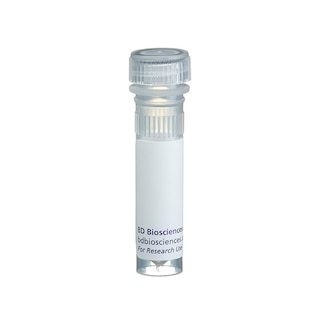
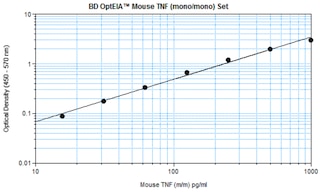
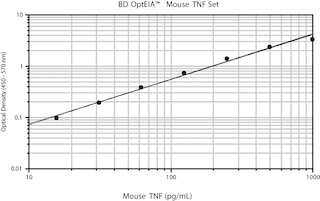
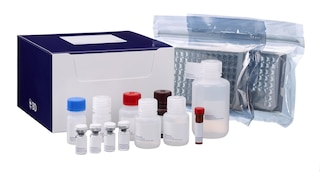
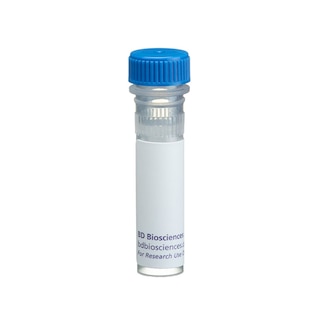
Development References (3)
-
Hogan MM, Vogel SN. Production of tumor necrosis factor by rIFN-gamma-primed C3H/HeJ (Lpsd) macrophages requires the presence of lipid A-associated proteins. J Immunol. 1988; 141(12):4196-4202. (Methodology: Bioassay). View Reference
-
Jaattela, M. . Biologic activities and mechanisms of action of tumor necrosis factor-α/cachectin. Lab Invest. 1991; 64:724-742. (Biology).
-
Prussin C, Metcalfe DD. Detection of intracytoplasmic cytokine using flow cytometry and directly conjugated anti-cytokine antibodies. J Immunol Methods. 1995; 188(1):117-128. (Methodology). View Reference
Please refer to Support Documents for Quality Certificates
Global - Refer to manufacturer's instructions for use and related User Manuals and Technical data sheets before using this products as described
Comparisons, where applicable, are made against older BD Technology, manual methods or are general performance claims. Comparisons are not made against non-BD technologies, unless otherwise noted.
For Research Use Only. Not for use in diagnostic or therapeutic procedures.